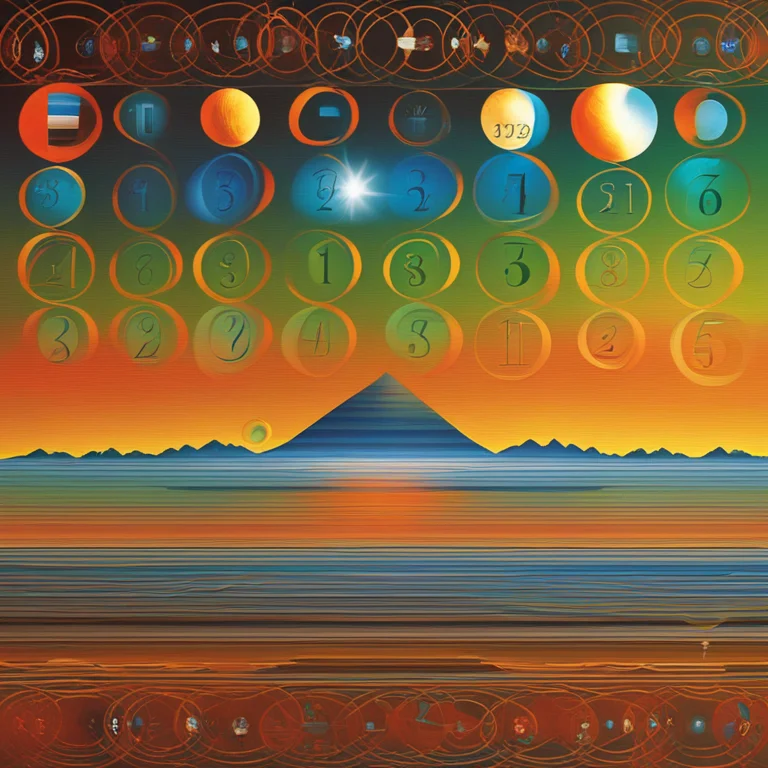
The Roots of Numerology: An Ancient Practice
Tracing the roots of numerology, this article delves into the ancient beginnings and figures attributed with the creation of this mystical system.
article by Sofia Ferguson
The Dawn of Numerology
Numerology, the belief in the divine or mystical relationship between numbers and coinciding events, is an ancient practice with a genesis shrouded in history's mists. Its principles are pervasive across countless cultures and epochs, with each civilization adapting its own forms and systems. Though it is challenging to pinpoint numerology's exact founder, its earliest known records date back to the mathematicians of ancient civilizations. Historians attribute the formalization of numerology to the ancient Greeks, Babylonians, and Egyptians, among others, where philosophers and mathematicians like Pythagoras and others contributed significantly to its evolution.

Pythagoras: A Pioneering Figure
Pythagoras, a Greek philosopher, and mathematician born around 570 BCE, is often acknowledged as a pioneering figure in the development of numerology. While not its inventor, his belief in numbers as the fundamental building blocks of reality laid the groundwork for numerological interpretations. Pythagoras' theorem and numerological concepts have persisted through the centuries, with his views influencing Plato and later scholars, embedding numerology within the framework of Western esoteric traditions.

Eastern Contributions
Simultaneously, in the East, numerology flourished with equal significance. Ancient Chinese civilizations, most notably, devised their own systems akin to numerology, such as the I Ching, which encompasses an elaborate form of divination based on hexagrams and their numerical associations. This tradition, deeply rooted in Taoist philosophy, showcases the global reach and intrinsic human fascination with numbers and their associated meanings.
Evolution Through the Ages
Over the centuries, numerology evolved through various cultures, each enriching and adjusting the established principles to match its cosmologies and beliefs. The Kabbalistic tradition within Judaism, for instance, uses Gematria, a method of interpreting Hebrew scriptures by associating letters with numbers. Through the medieval period to modern times, this blend of religious, philosophical, and occult practices has ensured that numerology remained a vital part of the mystical and metaphysical landscape.

Numerology’s Renaissance
The Renaissance period witnessed a renewed interest in numerology among alchemists and mystics, further melding mathematics with metaphysics. This era's scholarly and artistic endeavors saw numerological concepts infused into works of art, architecture, and music, reflecting the belief in a harmonious cosmic order. As the New Age movement picked up steam in the 20th century, numerology experienced a resurgence, popularized through books and teachings, propelling it into mainstream awareness.
Modern Numerology and Its Applications
Today's numerologists draw on ancient traditions, blending Eastern and Western methodologies to provide insights into individuals' life paths and relationships. Numerology's accessibility and the universal nature of its concepts have allowed for its continued relevance in an era of digital technology and scientific progress. Whether used for personal growth, understanding life events, or exploring compatibility, numerology's ancient foundation has proven adaptable and enduring.
Published: 1/11/2024
Modified: 1/11/2024
More predictions
Come back here soon to learn more about yourself and your future


The Mechanics of Numerology: Life's Numeric Patterns
Delve into the foundations of numerology and discover the numerological patterns that are believed to influence your life's journey.


The Mechanics of Numerology: An Insightful Guide
Discover how numerology provides unique insight into life's patterns, influencing decisions, personality traits, and future prospects.


Compute Your Numerology Life Path Number
Learn how to compute your life path number in numerology to gain insight into your life's purpose and potential trajectories.